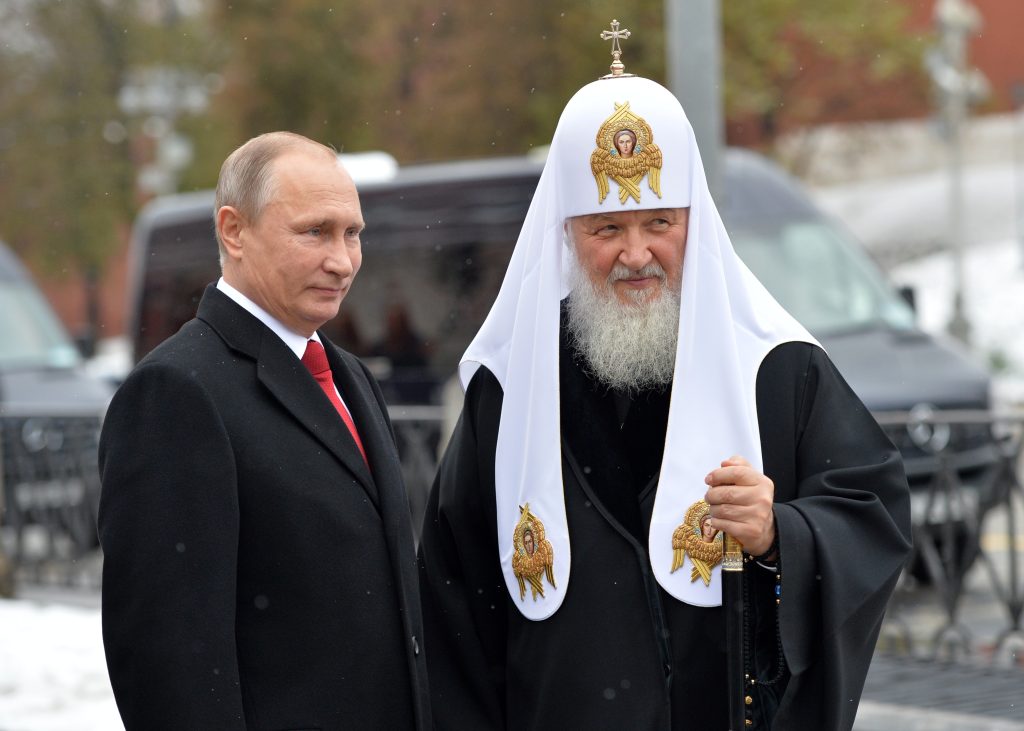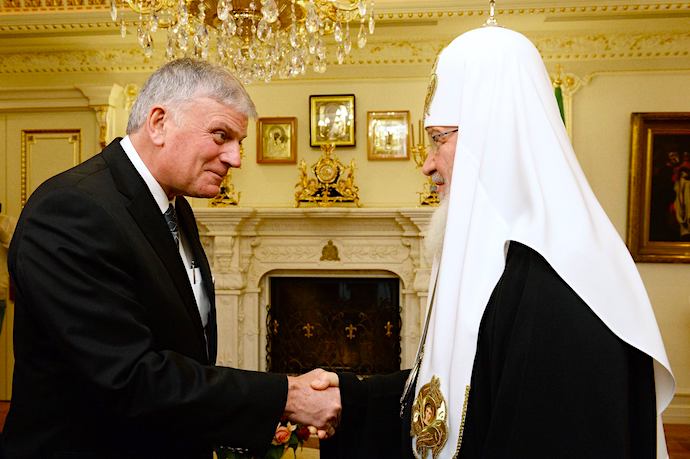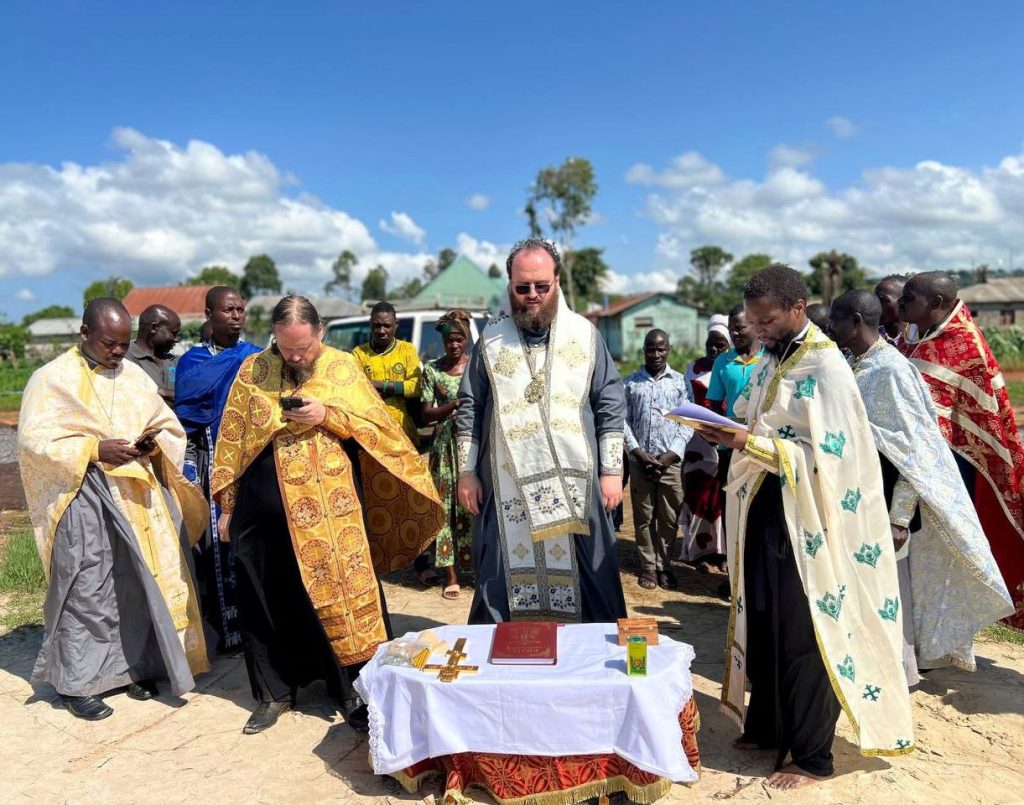
Regina Elsner is a professor of Eastern Churches and Ecumenical Theology at the Catholic-Theological Faculty at the University of Münster.
For the Christian world, religious legitimation of military aggression has become increasingly untenable, particularly after German Protestant and Catholic representatives stood on the side of Hitler’s warfare. Decades of theological engagement, reconciliation, and ecumenical dialogue followed the World Council of Church’s 1948 assertion that “war is contrary to the will of God,” and churches have since published countless documents positioning themselves as the vanguards of justice, peace, and preservation of God’s creation.
The Russian Orthodox Church (ROC) has been a part of this global movement for several decades, at times even in leadership positions. With Russia’s war against Ukraine, however, the Church now openly justifies a cruel, criminal war, including violations of human rights, the dismissal of all principles of international warfare, and the destruction of large parts of the environment and the international order. By justifying this war as a fight against metaphysical evil, the ROC became one of the most important pillars for Russia’s war ideology.
Stunningly, and in sharp contrast to the ecumenical community’s broad efforts to establish a universal concept of just peace, ecumenical partners have been unable or unwilling to openly and directly condemn the ROC’s pseudo-theological legitimation of the war, or even the public’s participation in militarization and warfare.

Two years after the full-scale invasion of Ukraine, and after ten years of the ROC’s vocal ideological support for the imperialistic and repressive ideology of Putin’s Russia, no church has formulated or published any kind of systematic approach to this positioning of one of the biggest actors in the ecumenical field. The critique formulated by ecclesial organizations like the Vatican and Pope Francis, the World Council of Churches, the Lutheran World Federation, and others firmly condemns only the war as such—the cruelty of the army, the death and abduction of civilians and military personnel, and, in part, the unprovoked aggression and violation of international law.
Only after some months of full-scale war and unqualified justification of the war by ROC leadership did many ecclesial actors begin to condemn the abuse of religious rhetoric for war; nevertheless, these actors did not criticize in detail the content of the ROC’s religious arguments or the clergy’s participation in crimes against humanity, support for the army, and public propaganda. While the political regime of Russia became more and more sanctioned and isolated internationally, the ROC—though an evident, major ideological partner of the Russian regime—is still part of the global Christian community. Thus far, all religious efforts at mediating or ending the war have failed, and all calls on the world’s religious authorities to engage theologically with the teachings of the Russian Church’s leadership have remained unanswered.
Securing Global Support for the War on the Liberal Order
There are various reasons for the durability of international ecumenical ties with the ROC. One of the most likely is the multi-level identity of every church, which makes it difficult to separate a church’s political functionality and spiritual community. I have argued elsewhere that entanglement of the political and the religious has been a longtime strategy of ROC leadership in international relations to immunize itself against critique and dismissal. However, in this confusing politization of religion, one of the widely underestimated aspects of the ROC’s international reputation is its anti-gender[1] networks.
During the last few decades, religious communities became important actors in anti-genderist strategies. Even though some of them adapted to the growing legal recognition of same-sex marriages, most Christian churches still underpin masculine power structures with the idea of a transcendent and eternal natural order of binary sexes. These religious communities argue that “gender-ideology” constitutes an existential threat to the natural order and, therefore, should be fought by political powers.
As anti-genderism has become a major focal point of global conflicts both ideologically and physically, Russia purposefully used this global tension to weaken international protest against its repressive and militarized system. The ROC created for itself a crucial role in this strategy, as for decades it engaged in conservative and traditionalist global networks. The “Moralist International” societal model, shaped as a conservative civilizational alternative to liberal models, attracted many people who felt skeptical, unsettled, or overstrained in view of the (post) modern, secular, and diverse order.

This model has appealed not only to the Vatican but to evangelicals in the global South and the United States. A more nuanced, ambiguous picture comes from countries like Poland or Hungary, which have taken a critical stance on Russia as a political power but share its traditionalist attitudes toward liberalism. In a popular discursive move, the notion of gender has been tied to the concepts of “ideology” and “colonialism” in order to draw on their symbolic capital.
Both concepts trigger the historical memory of the ROC as collective martyr to communist ideology and as an alleged bulwark against colonialism during the Cold War. According to this narrative, the ROC possesses a natural immunity to ideology and colonialism and serves as a true defender against both in the global arena. For societies from the global South and East, colonialism is strictly associated with the United States, which secures Russia broad sympathy for its purported pushback against the “Western enemy.”

For many years now, Russia and the ROC were perceived as providing protective power against the liberal order. Political ties to global right-wing parties and movements were accompanied by ecumenical connections on conservative issues, such as the “strategic alliance” with the Vatican (including access to the 2015 Synod of Bishops on the Family and a special paragraph in the 2016 Joint Declaration signed by Pope Francis and Patriarch Kirill in Havana), the pro-life movements in the United States and Europe, and increased presence as a Church in African and Southeast-Asian societies. Anti-genderism can appear as both a political issue and a religious dogma, making it a flexible tool for international relations (similar to the issue/dogma of peace in the Cold War international activities of the ROC).
A “War Like No Other”
As Petr Kratochvil and Mila O’Sullivan have argued, Russia’s war is the first war to be fought directly and openly against gender equality and can therefore be called a “war like no other.” Thus, questions of gender are not only an instrument of warfare, as they are in most wars, but they have become a direct target of the war itself and an explicit strategy among the other well-known strategies for justifying this war—security issues, spheres of interest, economic questions, and retention of domestic power.
Hence the topic of gender turns from a field of social discourse into a question of state security, and religious arguments on gender turn from a discursive element into justifications for security policies. In the sphere of international relations, this turn has been acknowledged and countered by strategies of solidarity and feminist foreign policy, both of which try to put issues of indivisible human rights on the agenda of security negotiations.
However, while some religions have changed or adapted their views on gender and sexuality, many other religious actors do not address this crucial turn at all. On the contrary, anti-genderism remains the focus and direction of religious culture wars on all continents. Conservative Christian churches continue to address gender equality with the same words as Patriarch Kirill in his infamous sermons justifying Russia’s war: as “gender ideology,” as a threat to traditional families, as incompatible with particular cultures or civilizations, or as means to oppress or extinguish particular cultures.
The prolongation of the anti-genderist position by global and regional Christian communities in the context of Russia’s war against gender-justice poses at least two serious problems.
First, by not accepting the securitization of gender discourse and its religious underpinnings, religious communities and their conservative or traditionalist partners remain—though unwittingly—among the strongest allies of the ROC and the Russian regime in their arguments in favor of the war.
Second, as religious communities fail to address one of the major arguments in this war, they are unable to contribute to any resolution of the war in accordance with the concept of “just peace.” To accord with this major Christian concept for conflict transformation, the aim of a dignified and just future for all persons affected by the war demands a profound theological approach to gender-justice. Without such an approach, religious communities cannot contribute to a just peace for Ukraine and to a sustainable disarmament of the Russian—Orthodox—war ideology.
Note:
[1] Anti-genderism describes mobilization against gender equality and sexual and reproductive health rights, with a focus on the term gender in legal and policy documents, which is perceived as dissolving the two “natural” sexes as a legal concept/category. Anti-gender networks are transnational movements that unite lobbying efforts and financial support to oppose such issues as women’s rights, same-sex marriage, LGBTIQ+ rights, reproductive rights, sexual education in schools, and universal democratic rights.
